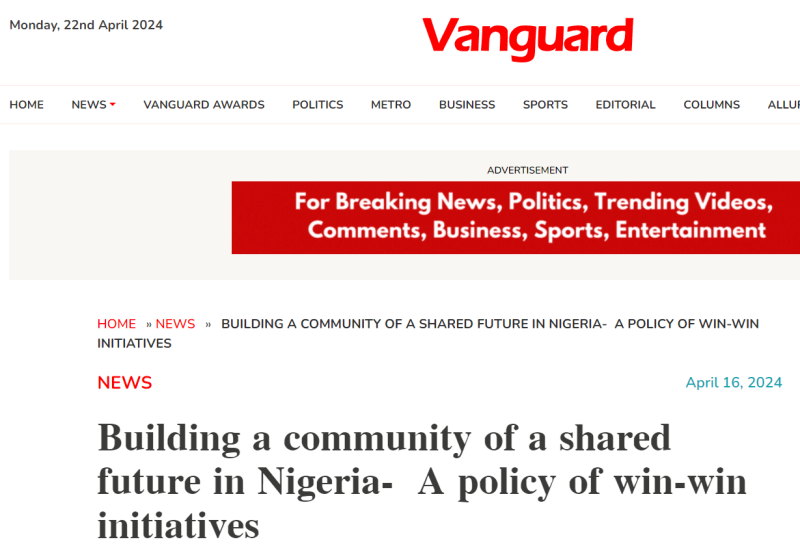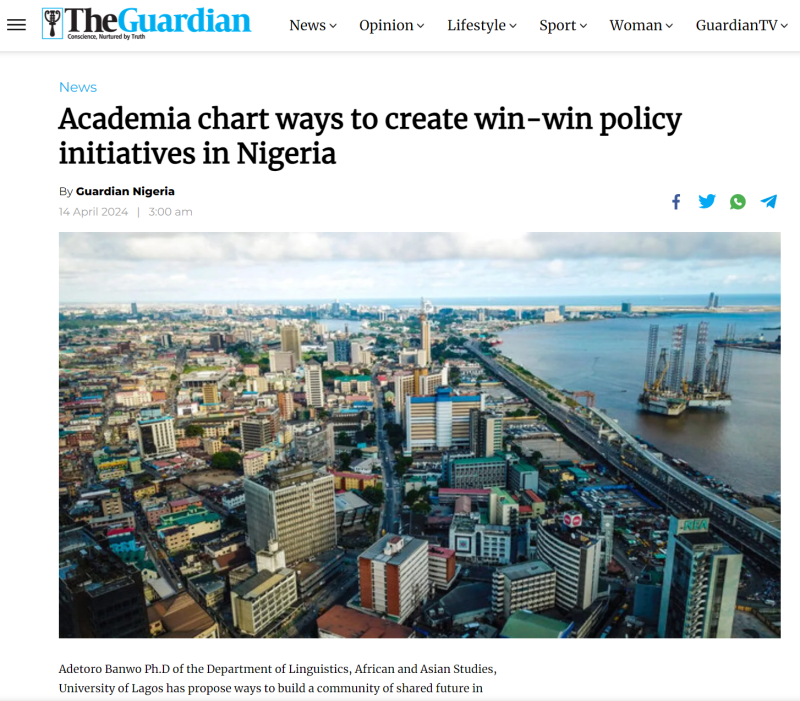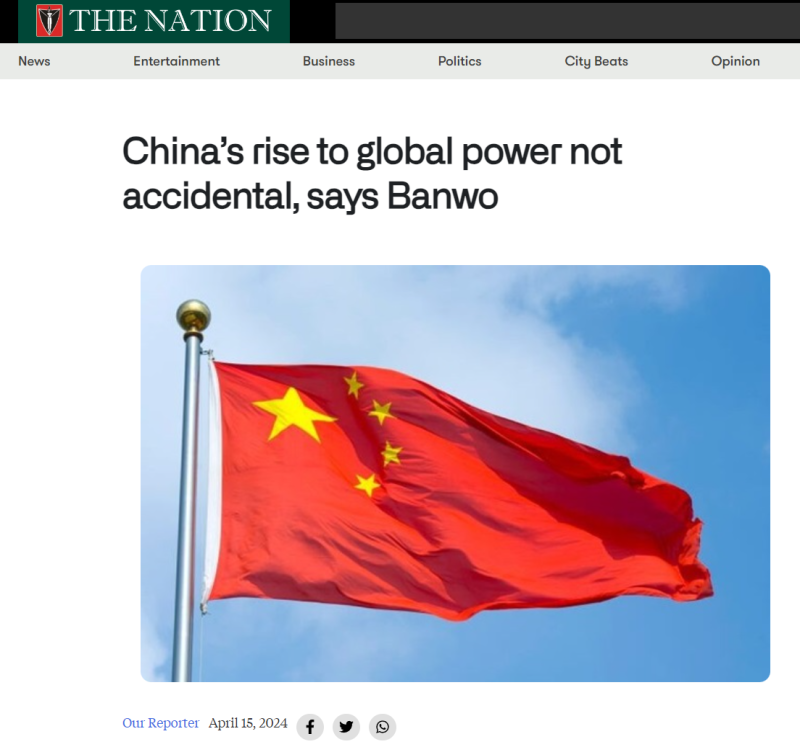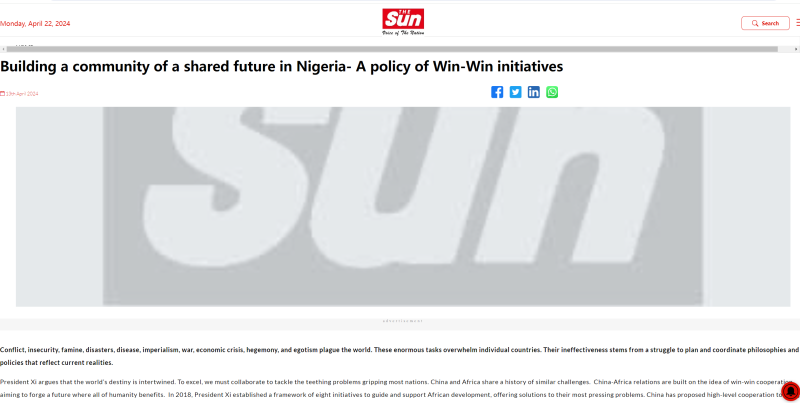Adetoro Banwo: Building a community of a shared future in Nigeria-A policy of win-win initiatives
Conflict, insecurity, famine, disasters, disease, imperialism, war, economic crisis, hegemony, and egotism plague the world. These enormous tasks overwhelm individual countries. Their ineffectiveness stems from a struggle to plan and coordinate philosophies and policies that reflect current realities.
President Xi argues that the world’s destiny is intertwined. To excel, we must collaborate to tackle the teething problems gripping most nations. China and Africa share a history of similar challenges. China-Africa relations are built on the idea of win-win cooperation, aiming to forge a future where all of humanity benefits. In 2018, President Xi established a framework of eight initiatives to guide and support African development, offering solutions to their most pressing problems. China has proposed high-level cooperation to bridge Africa’s development gap. This plan offers practical solutions by tackling Africa’s long-standing security challenges, promoting cultural exchange between China and Africa, and driving prosperity through participation in the Belt and Road Initiative. The Chinese Consul General in Lagos, Yan Yuqing, echoes these plans with her belief that Nigeria will experience renewed hope in this century. Indeed, the China-Nigeria relationship has demonstrably improved lives. It has provided Nigerians with income opportunities, exposed them to new knowledge, skills, and technology, and fostered a sense of optimism about a bright future illuminated by China’s partnership.
China’s partnership with Nigeria has dramatically transformed the country’s development landscape. New roads snake across Nigeria, connecting cities to hinterlands and towns. Ports have been built to boost trade and grow Nigeria’s Gross National Product. Infrastructure projects of monumental scale, like the Abuja-Kano, Port Harcourt-Maiduguri, and Lagos-Ibadan railway routes, have been successfully completed through Sino-Nigerian collaboration. These railways are the largest in Nigeria’s history, designed to facilitate the seamless transport of people and goods across the country. One immediate benefit is the explosion of small and medium enterprises (SMEs) and townships springing up along these railway routes and stops. These SMEs are the backbone of a healthy and thriving Nigerian economy. They provide income, create employment opportunities, and drive national growth by opening new markets for different regions.
China has bolstered Nigeria’s economy in several key ways. Their billion-dollar investment in the Lekki Deep Sea Port aims to streamline trade exports and imports not just for Nigeria, but for all of Africa. Constructing this port has created millions of local jobs, boosted Nigeria’s overseas trade patterns, and secured a stable stream of revenue for the country. The massive equipment used at the port has become a platform for knowledge exchange and skills transfer. China is empowering Nigeria to navigate the ever-changing dynamics of the modern world by equipping its workforce with these valuable hard skills. At a forum held at the Nigerian Institute of International Affairs, the Chinese Consul General, Yan Yuqing revealed that Nigeria-China trade volume reached $22.6 billion in 2023, making Nigeria China’s third-largest trading partner in Africa. This partnership is mutually beneficial. Nigeria imports a wide range of manufactured goods from China, filling the gap in its own manufacturing sector, which has been hampered by erratic power supplies, security concerns, and an unfavorable business climate. Meanwhile, China imports natural resources from Nigeria.
Recognizing that security is the cornerstone of national growth, President Xi Jinping urged African leaders to collaborate with China at last year’s China-Africa Leaders’ Dialogue in Johannesburg. His call to action focused on silencing the guns across Africa, establishing a cooperative security framework with long-term viability, prioritizing dialogue and cooperation to resolve conflicts, and facilitating peaceful political solutions to international and regional issues. This commitment to global peace and stability aligns with China’s established reputation as a force for world peace, a defender of the international order, and a champion of global development, as evidenced by its contributions to UN peacekeeping missions. China and Nigeria have actively partnered on security matters through military cooperation. During the 96th anniversary celebration of the People’s Liberation Army (PLA) held in Abuja, Senior Colonel Lin Wei pledged to facilitate training for Nigerian security personnel in critical areas like law and order, counterterrorism, and anti-piracy. This cooperation extends to supplying the Nigerian military with cutting-edge technology, including ICT drones, patrol vessels, and hardware. Further solidifying this partnership, the Chinese Navy conducted joint exercises on counterterrorism, anti-piracy, and search-and-rescue operations during a “journey of peace and security” visit to Nigeria. These actions demonstrate China’s commitment to supporting Nigeria’s security initiatives and fostering its development of an independent and peaceful foreign policy.
China’s cultural exchange efforts in Nigeria are driven by President Xi’s Global Civilization Initiative. This initiative emphasizes the value and importance of all human civilizations. President Xi promotes respect for cultural diversity, shared human values, and the ongoing exchange and innovation between cultures. People-to-people exchange and cooperation are central to this vision. In 2019, China held a “China Beyond Your Imagination” tourism week in Nigeria. This week aimed to showcase the cultural potential of both countries and deepen cultural ties. An eleven-person delegation of experts from Hainan Province, China, visited Abuja to share their knowledge of tourism, creative arts, and intangible cultural heritage. China and Nigeria partnered again in 2023 for a Cultural Fiesta Dancing Competition. Chinese Cultural Counsellor in Nigeria, Mr. Liu Xuda, emphasized the role of culture as the foundation for national development and a driver of social progress. The competition was designed to foster communication and understanding between the people of both nations. Building on this theme, China’s Consul General, Yan Yuqing, highlighted the importance of cultural exchange and mutual learning in creating an open and inclusive world. Sharing cultural values through festivals and artistic expressions is a key part of this vision. Last year, the Consulate of the People’s Republic of China in Lagos hosted a Chinese Film Festival. This festival provided Nigerians with exposure to China’s history, art, innovation, and heritage through cinema. It also offered opportunities for collaboration with Nigeria’s Nollywood film industry, promoting revenue growth and providing access to new skills and technology for Nigerian filmmakers.
About the author: Dr. Adetoro Banwo, Deputy Director of Confucius Institute at the University of Lagos (UNILAG)
This article was oringinally pubslihed on Vanguard News, The Sun Nigeria, The Guardian Nigeria News and The Nation






